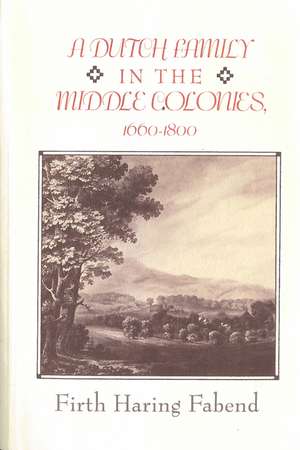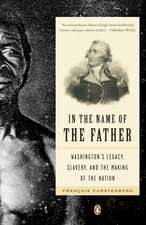A Dutch Family in the Middle Colonies: 1660-1880
Autor Firth Haring Fabenden Limba Engleză Paperback – 1999
Firth Haring Fabend has studied a large colonial American family over five generations. The Haring family settled in the Hackensack Valley (on the New York/New Jersey border), where they lived, prospered, and remained throughout the eighteenth century. Fabend looks at how this ordinary family of independent, middle-class farmers coped with immigration, established themselves in a community, acquired land and capital, and took part in the social, political, economic, and religious changes of the seventeenth and eighteenth centuries.
As she traces the lives of the Harings and their neighbors, Fabend focuses on their marriage and childbearing patterns, living conditions, agricultural methods, and relative economic position. She investigates inheritance patterns, concluding that the position of women deteriorated under English law. She is equally interested in the political and religious life of the family. The Harings formed a church fitting their Pietist beliefs, and this church became central to community life. Their theology encouraged them to question religious authority, which in turn fostered the questioning of political authority. Their community became a seedbed for revolutionary activity. Fabend examines the family's position in the Revolution--primarily patriot--and the losses they suffered in that conflict.
The Harings of colonial America were ideal yeoman farmers, a class that stood well in the social hierarchy of the day. They were industrious, they prospered, and they participated in the civic life of colonial America. But once the new republic formed, they were not very visible. Fabend argues that they maintained their "Dutchness" more consciously than ever after the Revolution, which hindered their full participation in public affairs. In some ways, the fifth and sixth generations were more Dutch than the early generations.
As she traces the lives of the Harings and their neighbors, Fabend focuses on their marriage and childbearing patterns, living conditions, agricultural methods, and relative economic position. She investigates inheritance patterns, concluding that the position of women deteriorated under English law. She is equally interested in the political and religious life of the family. The Harings formed a church fitting their Pietist beliefs, and this church became central to community life. Their theology encouraged them to question religious authority, which in turn fostered the questioning of political authority. Their community became a seedbed for revolutionary activity. Fabend examines the family's position in the Revolution--primarily patriot--and the losses they suffered in that conflict.
The Harings of colonial America were ideal yeoman farmers, a class that stood well in the social hierarchy of the day. They were industrious, they prospered, and they participated in the civic life of colonial America. But once the new republic formed, they were not very visible. Fabend argues that they maintained their "Dutchness" more consciously than ever after the Revolution, which hindered their full participation in public affairs. In some ways, the fifth and sixth generations were more Dutch than the early generations.
Preț: 321.08 lei
Nou
Puncte Express: 482
Preț estimativ în valută:
61.45€ • 66.72$ • 51.61£
61.45€ • 66.72$ • 51.61£
Carte tipărită la comandă
Livrare economică 23 aprilie-07 mai
Preluare comenzi: 021 569.72.76
Specificații
ISBN-13: 9780813526904
ISBN-10: 0813526906
Pagini: 326
Ilustrații: 24 black & white illustrations
Dimensiuni: 152 x 229 x 23 mm
Greutate: 0.51 kg
Ediția:None
Editura: Rutgers University Press
Colecția Rutgers University Press
ISBN-10: 0813526906
Pagini: 326
Ilustrații: 24 black & white illustrations
Dimensiuni: 152 x 229 x 23 mm
Greutate: 0.51 kg
Ediția:None
Editura: Rutgers University Press
Colecția Rutgers University Press
Notă biografică
Firth Haring Fabend received her Ph.D. in American Civilization from N.Y.U. She has published numerous articles and five novels; this is her first scholarly book.
Descriere
Novelist and museum consultant Fabend, a direct descendant of the original Haring settler, follows five generations of the family of New York and New Jersey in an attempt to uncover the economic, political, and religious underpinnings of the middle colonies. Researching court, tax, and probate records, she finds that the Harings in America reflected their Dutch origins: they were entrepreneurial farmers who lived in nuclear families and acted in their economic and political self interest. She also verifies the conclusions of family historians of the last 20 years who have documented colonial demographic patterns which bear resemblance to current trends. Though overstating the Harings's representative stature and relying upon such post-agrarian concepts as class to analyze colonial America, the author provides a much-needed investigation of life in the middle colonies. This book will appeal to colonial, family, and social historians.









